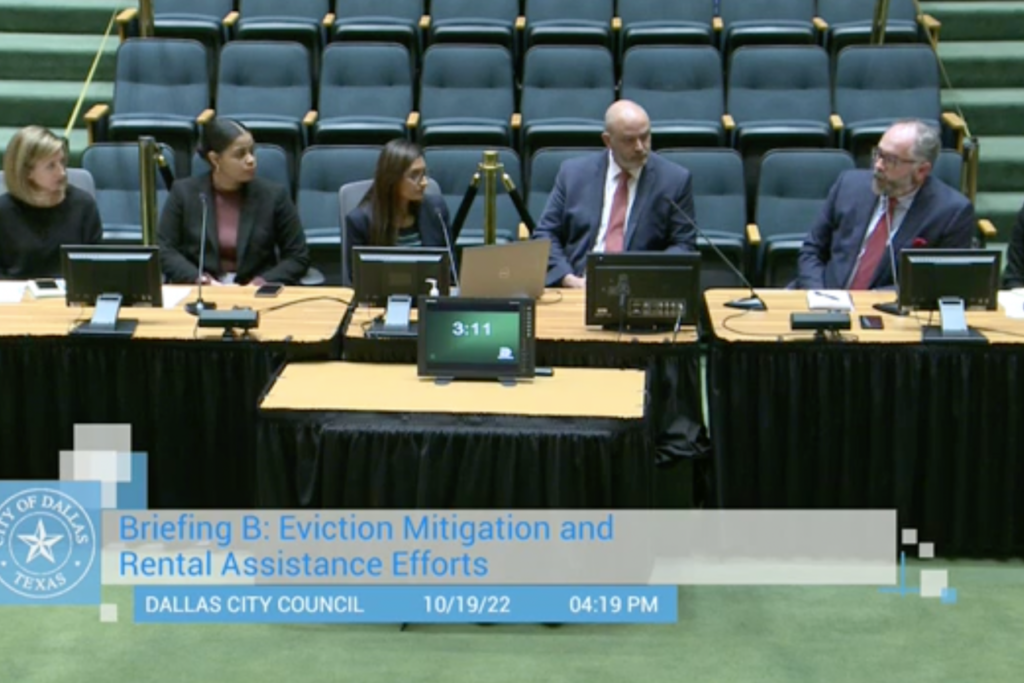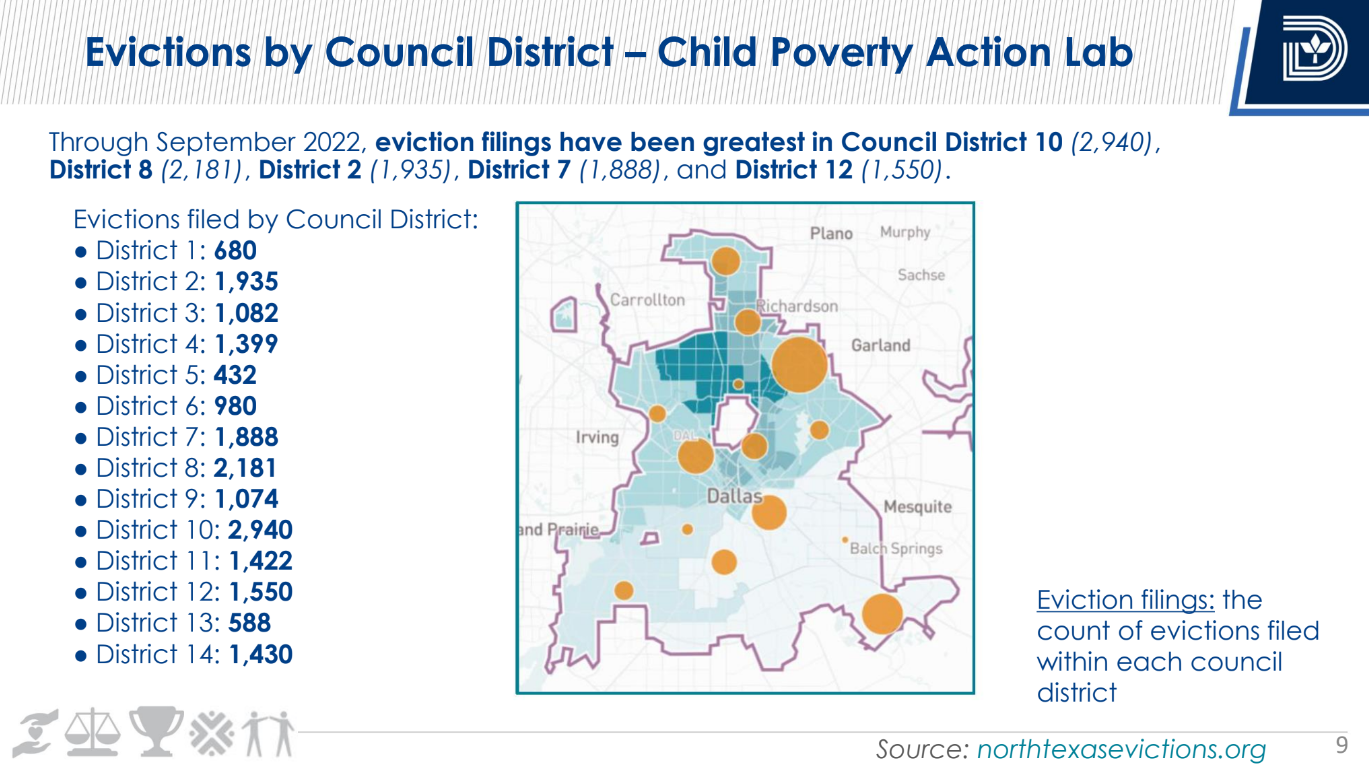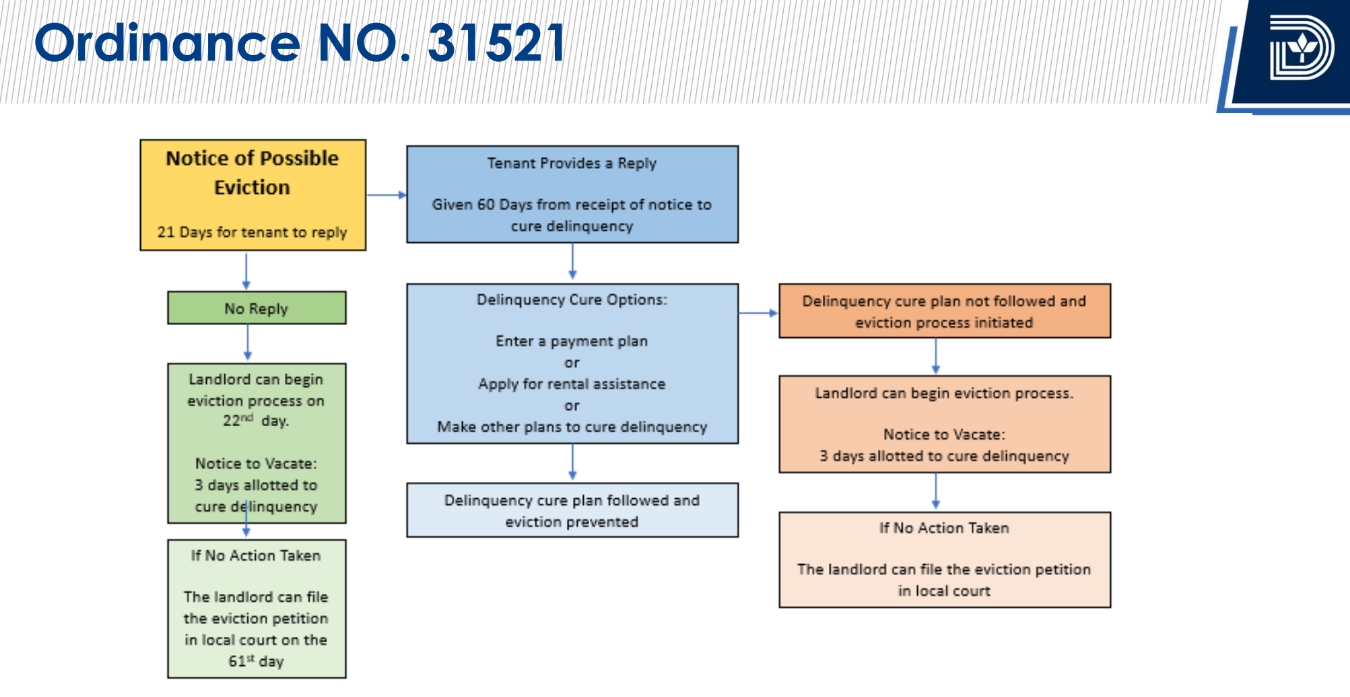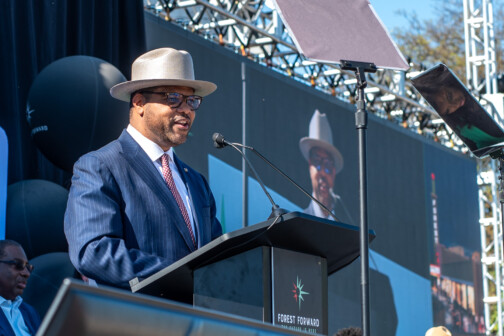Since the spring of 2020, Dallas landlords have been subject to a COVID-19 eviction ordinance that gave tenants more time to respond to eviction notices, be that through paying back rent or finding a new place to live.
The Apartment Association of Greater Dallas says it’s time to walk back the ordinance, which was adopted in April 2020. At Wednesday’s City Council briefing, Jason Simon, the organization’s government affairs director, told the Council that Dallas was one of the only cities in the state to still have a COVID-era eviction ordinance on the books. He asked the city to consider ending it.
“At the time the ordinance was adopted, the unemployment rate was more than 12 percent, there were no COVID vaccines available, there was no emergency rental assistance funding available,” he said, adding that things have changed considerably since that time. “The original intent of the ordinance was to encourage communication between the property owner or manager and the renter in the hopes of negotiating payment plans for past due rent.”
Simon said that the federal Coronavirus Aid, Relief, and Economic Security (or CARES) Act also requires a 30-day notice at any property that participates in federal housing programs or federally backed loans in addition to the 21-days the city requires. He argued that this means some property owners are “not receiving rental income for a minimum of two months, and sometimes longer.”
Advocates say that the ordinance is still saving some families from eviction and that there’s data to show that some sort of renter protection is still needed. This is the needle Dallas must thread.
“We still know that many of our residents are still in a crisis situation when it comes to being able to retain their housing, as well as being able to assert their rights in tenant proceedings,” Assistant City Manager Liz Cedillo-Pereira told the Council Wednesday.
Simon said that while the COVID-era ordinance needed to end, it “doesn’t signal the end of renter protections or further rental assistance funding that remains in place.”
According to figures from the Child Poverty Action Lab, from January 1 to September 30 there were nearly 20,000 evictions filed in the city of Dallas, a 126 percent increase from last year. Evictions were filed at a rate of 65 per 1,000 renters, with the average renter being in arrears for not quite $2,500.
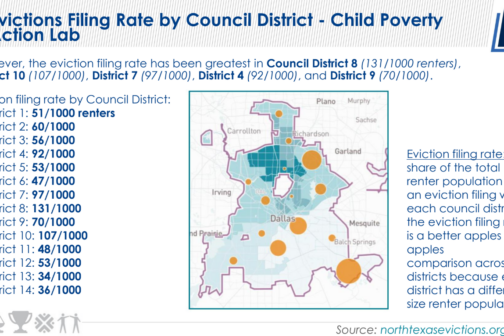
According to the COVID-related ordinance currently on the books, once a landlord gives a tenant notice of a potential eviction, the tenant has 21 days to respond. If the tenant doesn’t, the landlord can officially start the eviction process on the 22nd day with a notice to vacate. From that point, the tenant has three days to pay up or set up a plan to pay up. If that doesn’t happen, the landlord can file an eviction petition in court on the 61st day from the first notice.
Mark Melton, the attorney who co-founded the pro bono Dallas Eviction Advocacy Center, told the council that the 21-day delay was originally intended to provide tenants time to prove that they had a COVID-related issue that caused them to miss rental payments.
“That doesn’t happen so much anymore,” he said. If tenants do show this proof, they get a full 60-day period to respond to that eviction notice and find a way to pay their late rent. They can either set up a payment plan, get rental assistance, or find some other way of coming up with the money. If they can’t, the landlord can then issue the tenant a notice to vacate, which would give them three days to pay or be evicted.
Cedillo-Pereira said a draft for a permanent ordinance was in the works, but that it wouldn’t be ready for a vote until early next year. That new ordinance would require some of what the COVID ordinance does—time for the tenant to respond and pay up, for instance—but would allow the landlord to evict “as usual” for other lease term violations.
Before the briefing, Melton said that he felt a draft ordinance he helped create with the apartment association to sunset options for the COVID ordinance should be “scrapped” since it was predicated on emergency rental assistance money that no longer exists.
“Instead, we should maintain the status quo and move toward a permanent ordinance that offers reasonable protections to our most vulnerable residents as quickly as possible,” he wrote on Facebook Wednesday. The city recently announced that so many people had applied for assistance that all the money was already allocated, and applications were closed.
“No one expected that to happen,” Melton said. “The temporary ordinance was drafted to sunset once the rent assistance was no longer available. So if this ordinance was passed, as is, it would effectively be dead on arrival. Its passage would immediately sunset this revised ordinance and the existing ordinance, leaving tenants with no protections at all.”
Melton said he would rather see a permanent ordinance before the end of the year, which would include landlord buy-in as well as protections to vulnerable tenants.
“The plan was always to follow up after this temporary revision was passed with a permanent ordinance crafted to address non-pandemic-related scenarios,” he said. “I’m hopeful we can get this done by December.”
Councilman Adam Bazaldua also advocated for tenant protections until permanent measures could be codified, saying it was “absurd” to sunset a measure that was protecting the most vulnerable Dallasites.
“But for us to allow this go off the books and sunset something that is protecting people and allow the most vulnerable to be on the streets, and then be back here making decisions on how to put dollars to putting them into shelters or giving them resources as homeless residents, is absurd,” he said. “We have the opportunity now to do the right thing.”
Councilwoman Cara Mendelsohn, however, wondered if tying up available affordable units with people who can’t pay rent was also contributing to the affordability crisis in the city. Landlords are forced to raise rents at other properties to make up for shortfalls, she argued, which creates a new group of people that can’t afford to pay their rent.
“On a macro level, I think we’re actually causing more problems than we’re fixing,” she said. “This is a COVID ordinance…we have to recognize that even the president is saying COVID is over.”
But Melton and other advocates explained that the ordinance did a better job of evening the odds for the tenant than the eviction laws before the pandemic did.
“These laws are supposed to protect the landlord and the tenant,” he told the council. “Historically, they have done a really good job of protecting the landlord, but they didn’t protect the tenant at all. So now, we can say, ‘You have to start over because the law provides a specific series of steps you’ve got to take, and if you don’t, you have to start over.’”
While nothing was hammered out on Wednesday exactly, it does seem that the council realizes two things: A COVID ordinance—no matter how effective—cannot go on forever, but the city will need to figure out how to protect vulnerable residents through its housing policy plans sooner than later.
Author



